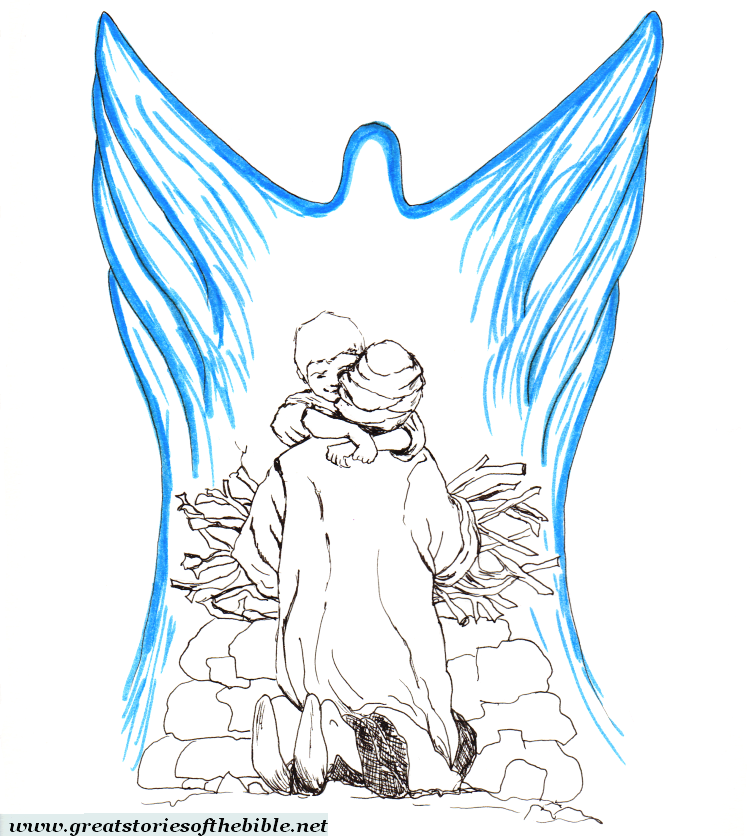Isaac
The beloved son
We continue with the story of Abraham and Isaac and the strange sacrifice that was required by the Lord (Gen 22): «“Now take your son, your only son, whom you love, even Isaac, and go into the land of Moriah. Offer him there for a burnt offering on one of the mountains which I will tell you of.” Abraham rose early in the morning, and saddled his donkey, and took two of his young men with him, and Isaac his son. He split the wood for the burnt offering, and rose up, and went to the place of which God had told him». God’s request is ambiguous: in Hebrew the order can be translated as “pick up your son as a burnt offering” (burn Isaac on the altar), or “pick up your son for a burnt offering” (go with Isaac on the mountain to teach him the worship practice of sacrificing an animal by burning it on the altar). Abraham, we will see it later, will understand the request in the first sense, the most challenging for him. Even among the Canaanites, who lived around Abraham, it was customary to sacrifice of the first-born of the king to bless the foundation of a city: perhaps even the God who called him from a far country asks for human victims?
«On the third day Abraham lifted up his eyes, and saw the place far off. Abraham said to his young men, “Stay here with the donkey. The boy and I will go yonder. We will worship, and come back to you.”». Here again we find the travel to an unknown destination, given by God, but this time with a heavy heart, for the terrible order that only Abraham knows. Is he lying to his servants when he speaks about the return of both (he and his son)? The Fathers of the Church see instead in this text his faith in the resurrection: the God who had given him that heir from a barren mother would be able to raise him up even after the sacrifice and keep the promise of a numerous offspring.
«Abraham took the wood of the burnt offering and laid it on Isaac his son. He took in his hand the fire and the knife. They both went together. Isaac spoke to Abraham his father, and said, “My father?” He said, “Here I am, my son.” He said, “Here is the fire and the wood, but where is the lamb for a burnt offering?” Abraham said, “God will provide himself the lamb for a burnt offering, my son.”». Christians have seen in the figure of Isaac carrying the burden of wood the Christ who, innocent carrying the cross, goes on the mountain: both priest (the wood is brought by the officer) and victim. Abraham’s answer to his son perhaps manifests still the hope of a God’s intervention that would change the fate of the sacrifice.

«So they both went together. They came to the place which God had told him of. Abraham built the altar there, and laid the wood in order, bound Isaac his son, and laid him on the altar, on the wood. Abraham stretched forth his hand, and took the knife to kill his son. The angel of the LORD called to him out of the sky, and said, “Abraham, Abraham!” He said, “Here I am.” He said, “Do not lay your hand on the boy, neither do anything to him. For now I know that you fear God, seeing you have not withheld your son, your only son, from me.” And Abraham lifted up his eyes and looked, and behold, behind him was a ram caught in the thicket by his horns. Abraham went and took the ram, and offered him up for a burnt offering instead of his son».
The Lord stops Abraham at the last minute: the test is passed! What was the teaching received from these facts? First of all: He who called Abraham is the Lord giver of life, not a god like the Canaanites’ one who claims the blood of the first-born (note the difference of the names used: at the beginning of the story his name is “God” at the end “Lord”). Second: Abraham was dispossessed of Isaac his beloved son, with that “sacrifice” he recognized him as a gift from the Lord and not as his personal property, releasing the fullness of God’s blessings in his seed (Gen 22,16-18). Third: the Lord made Abraham’s faith perfect: «Wasn’t Abraham our father justified by works, in that he offered up Isaac his son on the altar? You see that faith worked with his works, and by works faith was perfected» (Jas 2,21-22).
Isaac will marry Rebecca, granddaughter of Abraham’s brother Nahor. Abraham sends his servant to take her from the land of the Chaldeans. He does not want to give his son in marriage to a woman of Canaan, nor does he want Isaac to return to his country of origin. This would be to disobey the Lord who had called him out of it. From Rebecca, barren like Sarah, Isaac will have twins thanks to the Lord’s intervention: Esau and Jacob, whom we will meet in the next post about the Stories of the Bible.